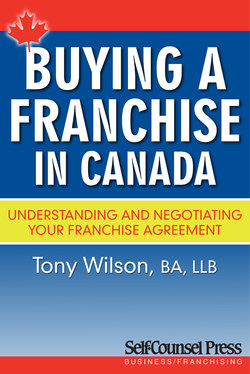Читать книгу Buying a Franchise in Canada - Tony Wilson - Страница 18
На сайте Литреса книга снята с продажи.
2.1 Who holds the deposit?
ОглавлениеThe most important practical problem at this stage is, who holds the deposit and how do you get it back if the deal falls apart? The deposit is going to be held by either the franchisor or the franchisor’s commissioned salespersons. If you decide not to go further in the process, cannot acquire bank financing, or do not approve the location the franchisor has subsequently chosen and you request the deposit monies to be returned, the money may be difficult to get back. In some systems, the franchisor or its sales agents have already spent the deposit monies and are waiting for other deposit monies or initial franchise fees from other franchisees that will be used to repay you if you are seeking your money back. This could take months, and legal action respecting return of deposit monies is not cost-effective for you if you are forced to hire a lawyer to commence legal proceedings. So when you ask for the money back, it’s gone, and it may be gone for some time. (By the way, this does not usually happen with Canada’s established franchisors.)
One option is that if you are able to approach your lawyer in advance of signing the deposit agreement, deposit monies could be placed either in trust with your lawyer or in trust with the franchisor’s lawyer on undertakings to return these monies immediately upon you deciding not to enter into the franchise agreement. Be aware that franchisors or their sales agents may delay the return of deposits for the aforementioned reason or to give one more try at the sales process.
For lawyers, nothing speaks louder than an undertaking, which is a contract between the lawyer accepting the undertaking and the person putting the lawyer on the undertaking. Lawyers who fail to comply with undertakings risk disciplinary action by their Law Society. Although some franchisors aren’t fond of this approach, it is an efficient means of ensuring that the franchisor knows that you are serious while at the same time ensuring that if the deal does not proceed, the money hasn’t been spent and can be returned quickly to you. It shows that if you’re still just a tire kicker, you’re a smart one!
Undertakings placed on lawyers have a way of focusing a lawyer’s attention. Lawyers aren’t keen on receiving disciplinary letters from their Law Societies, let alone disbarment. So its probably fair to consider holding the deposit in trust with a lawyer — even the franchisor’s lawyer — when dealing with a start-up franchisor with a limited or non-existent track record, or if you are dealing with a start-up regional franchisee (i.e., a master franchisee for a province that is not the same entity that controls the US franchise rights), or if you’re dealing with commissioned sales agents in the previously cited circumstances.
The well-known and established franchise companies don’t normally spend the deposit monies before they receive the initial franchise fee. They aren’t adding much to the bottom line by trying to keep $1,000 of your deposit money. I’d probably take the established franchisor’s word that your money will be returned forthwith and I probably wouldn’t put the deposit money in trust with a lawyer. (Most of Canada’s established franchise community are members of the Canadian Franchise Association. If the franchisor you’re dealing with isn’t, ask why.)
The established and reputable franchisors will return the monies forthwith; however, certain deposit agreements may contain a provision whereby the franchisor is entitled to deduct a portion to compensate it for its administrative time. This portion may vary. Usually the agreement will say a reasonable amount and the parties are left figuring out what reasonable is. For example, if a franchisor kept $1,000 out of a $5,000 deposit, it wouldn’t be unreasonable unless the deposit agreement said “fully refundable.” This depends on the costs the franchisor has incurred.
As an aside, if there are significant conditions in the future to be satisfied by the franchisor (e.g., securing a location), having all or a portion of the initial franchise fee held in trust by your lawyer or the franchisor’s lawyer may also be a means of “getting it back quickly” in the event the condition is not satisfied but the money has been paid.
